Partners for Sustainable Progress

United We Stand, Divided We Risk Instability
I believe there is real momentum behind the enlargement agenda right now, and it’s crucial not to let this opportunity slip away. We have shared challenges that require a united European response
Eirik Nestås Mathisen
Special Envoy for the Western Balkans of the Ministry of Foreign Affairs of the Kingdom of Norway
The Western Balkans continues to face complex political, economic and security challenges. It is nonetheless important to view these challenges within a much larger framework, says Eirik Nestås Mathisen, Special Envoy for the Western Balkans of the Ministry of Foreign Affairs of the Kingdom of Norway, speaking in this interview for CorD.
“First of all, it’s important not to view the Western Balkans as separate from the rest of Europe. Whether in the northwest, like Norway, or the southeast, like Serbia, we are all part of the same European community. Many of the challenges we face are shared, and they require a united European response,” says our interlocutor. “That’s why I firmly believe

European integration is the best path forward—economically, politically, and when it comes to improving daily life. The risks we face are often the reverse: when unity and cooperation are lacking, vulnerability and instability grow.”
Serbia is widely seen as a key player in the region. How do you view its role in promoting long-term regional stability and constructive cooperation among neighbours? — I agree that Serbia is a central player, both in this region and beyond. We count on Serbia to be a positive contributor to stability. I believe that, in this regard, mutual respect and understanding also form a solid foundation for our good bilateral relations.
When it comes to regional cooperation, it’s important to not only focus on remaining challenges, but also to acknowledge the progress made. There are certainly outstanding issues and untapped potential, but much has also been achieved, for instance when it comes to the common regional market. Serbia has both contributed to this and gained significantly from it. I see regional cooperation not as a substitute for European integration, but as a valuable and necessary part of it.
How would you assess Serbia’s progress on its path to EU membership, particularly in areas related to democratic governance, the rule of law and human rights?

TRUST
In a polarised environment, investing in trust-building may seem risky, but I would argue that the greater risk lies in not investing in it enough
SUPPORT
International law and cooperation face pressure, and Norway sees steadfast support for Ukraine as being crucial to overcoming these challenges
COOPERATION
Norway prioritises helping Serbia integrate into the EU, as Serbia’s progress also strengthens Norway’s close cooperation with both Serbia and the EU
— Supporting Serbia and the other candidate countries in their European integration processes is a priority for Norway. While we’re not an EU member, we are part of the single market and today enjoy our closest ever cooperation with the EU. Serbia’s EU integration is therefore also very important for our own cooperation with Serbia.
I believe there is real momentum behind the enlargement agenda right now, and it’s crucial not to let this opportunity slip away. I also think it’s important to stress how integrated Serbia is with the rest of Europe, not least in terms of the economy. In this sense, I am convinced that there is so much to gain from accelerating integration efforts, both in terms of reducing vulnerabilities and in terms of opening up new opportunities. But, yes, I would also have preferred to see the process more advanced than it currently is.
I agree with what president von der Leyen said during her visit to Belgrade in October: now is the time to double down on the efforts. Democracy, the rule of law and human rights are fundamental issues in this regard. I can only encourage all parts of society to unite around this agenda.
Trust is central—and it takes far longer to build than to lose. In a polarised environment, investing in trust-building may seem risky, but I would argue that the greater risk lies in not investing in it enough.
It is well known that this region faces pressing security challenges – ranging from disinformation and institutional fragility to unresolved political disputes. What do you see as the most urgent prior-
ities to ensure long-term regional stability?
— It is important to acknowledge that the current context, first and foremost stemming from Russia’s illegal war of aggression in Ukraine, reinforces existing vulnerabilities. Strategic dependencies are being leveraged. International law and multilateral cooperation are under heavy pressure. Fake news and disinformation are actively used to further undermine unity and democratic processes.

I agree with what president von der Leyen said during her visit to Belgrade in October: now is the time to double down on efforts
For Norway, standing firmly with Ukraine is central to addressing these challenges. This is also what we ask of our friends. Ukraine’s future is of fundamental importance to stability in Europe.
In the region, we strongly support the EU-led dialogue and the efforts of Peter Sørensen. This also remains a
crucial component of successful European integration, which in turn is key to long-term stability.
Energy security and sustainability are high on the agenda across Europe, including in Serbia. Where do you see the most promising avenues for cooperation between Norway and Serbia in renewable and green energy, and in transforming the Serbian Power Company into a modern and efficient enterprise? — I am pleased that Norwegian experiences and competence in the energy sector have been highly valued in Serbia, both in the private and public sectors. It is true that Norway plays a special role as a reliable supplier to Europe and that we have a lot of experience in oil, gas and renewable energy.
I understand that the energy situation is difficult now and that many in Serbia worry, particularly with winter coming. Many European countries, citizens and companies have faced similar challenges since the 2022 invasion of Ukraine. However, the EU showed how dependencies can be overcome through diversification and cooperation. I believe this is the way forward for Serbia as well, in close cooperation with the EU. Serbia has every potential to succeed in diversifying and attracting more investment in renewables, but that requires clear, strategic decisions. What I see elsewhere in Southeast Europe is that investors are looking for opportunities in places where the energy systems are well integrated with the rest of Europe, both in terms of regulation and infrastructure. In many ways, this is a strong argument for what we discussed earlier in terms of the dividends of regional and European integration.

H.E. Mrs Pernille DAHLER KARDEL Ambassador of Denmark
SEIZE THE ENLARGEMENT MOMENTUM
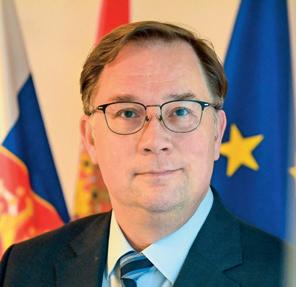
H.E. Mr. Niklas LINDQVIST Ambassador of Finland
DEEPENING STRATEGIC COOPERATION
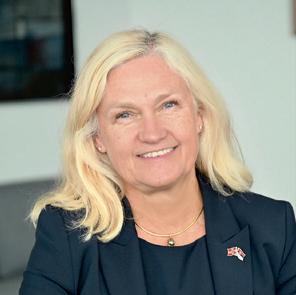
H.E. Ms Kristin MELSOM Ambassador of Norway
MANY OPPORTUNITIES FOR COOPERATION
Business Dialogue
LEADER`S MEETING POINT

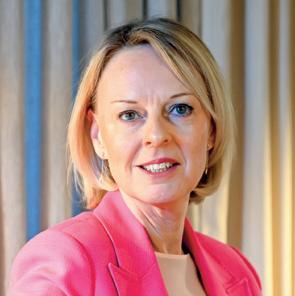
H.E. Mrs. Charlotte Sabina SAMMELIN Ambassador of Sweden
HELPING ENERGY STABILITY AND THE GREEN TRANSITION
NAVIGATING IN CHANGING BEVERAGE TRENDS PAVEL ERANKEVICH
Managing Director at Carlsberg Serbia Group 08
GLOBAL EXPERIENCE AND LOCAL EXPERTISE
MARIJANA VASILESCU CEO of MediGroup 12
SCIENCE AND PARTNERSHIP FOR BETTER HEALTH ALEKSANDAR TRIPKOVIĆ
Governmental Affairs & Market Access Manager, Astra Zeneca 20

PARTNERSHIPS THAT BUILD SUSTAINABLE COMMUNITIES
IVA PETROVIĆ
Executive Director of the Nordic Business Alliance 22
Seize the Enlargement Momentum
Serbia has the opportunity to seize the enlargement momentum by delivering credible reforms – above all in the areas of the rule of law and media freedom – and by fully aligning with EU values and the Copenhagen Criteria. Progress is in its hands
H.E. Mrs Pernille DAHLER KARDEL
Ambassador of Denmark to Serbia
Denmark assumed the Presidency of the Council of the EU in July 2025 under the motto “A Stronger Europe in a Time of Change.” The motto is self-explanatory, says H.E. Mrs Pernille Dahler Kardel, Ambassador of Denmark to Serbia: “A stronger Europe means a united Europe, which calls for joint and increased efforts – both from us as member states, and indeed from candidate countries progressing on reforms.”
It is difficult to state any concrete outcomes, as this is a work in progress, she notes, but during the Danish Presidency “the focus is on initiating activities, implementing specific laws that will make Europe stronger and more competitive, increasing our ability to defend ourselves through greater investment in the military, and, of course, encouraging the Union’s enlargement and thereby enhancing European unity,” says the Ambassador.
“As has also been announced by our official sites and our ministers, the Presidency will make efforts to promote a strong European space sector, boost competitiveness by simplifying EU regulations and making business opportunities easier for companies, and stimulate green investments as well as technological development across Europe,” says our interlocutor.
As may be well known, she adds, Denmark has been successful when it comes to public–private collabora-

tion. “That is also how we became a frontrunner in the green transition when the oil crisis forced us to come together in pursuit of a sustainable future – it was driven by a desire to go green as well as by the need to develop our economy. It was a solid public–private partnership that drove that success. We strongly believe that the green transition is essential to building a more secure and competitive Europe, and the Danish–Serbian
partnership in reducing emissions is a valuable one. We will continue to join and strengthen efforts on renewable energy, where Danish expertise sharing and support are already ongoing,” says the Ambassador. When it comes to energy, the Presidency will push for smart initiatives to boost Europe’s energy security, competitiveness and green transition, focusing on clean, affordable power for all – one crucial priority being the pur-
DECARBONISATION
We see the green transition as key to a secure and competitive Europe and will continue to strengthen the Denmark–Serbia partnership in the field of renewables and emissions reduction
OPPORTUNITY
Denmark views EU enlargement as a security necessity in the wake of Russia’s invasion, giving renewed momentum to Western Balkan candidates. A more united Europe is a stronger Europe
PROGRESS
Progress achieved by the REM Council and in the review of the voter register is welcome. Key work remains: strengthening the rule of law and media freedom in order to advance on the EU path
suit of a united EU that is independent of Russian energy.
Enlargement has recently been framed as a geopolitical necessity rather than a purely normative project. How does Denmark interpret this shift, and what does it mean for candidate countries such as Serbia?
— This shift creates new momentum for all candidate countries, including Serbia. It is not merely a wish, but rightfully stated: a necessity. A necessity because the full-scale invasion of Ukraine has shaken Europe’s security. A more united Europe is a stronger Europe.
In these uncertain times, one thing is very certain: the stronger the unity of Europeans, the stronger we are together
Therefore, enlargement is important to secure and connect us as Europeans even more. In these uncertain times, one thing is very certain: the stronger the unity of Europeans, the stronger we are together. Serbia and Denmark share decades of good and respectful partnership, also reflected in our cooperation on the green transition. So, this new momentum for enlargement is an opportunity for Serbia to step up its efforts and make the progress needed.
We are determined to support Serbia on its EU path, and you can always count on us as a reliable partner in sharing our experiences and supporting reforms. But enlargement is not a one-way process – the Copenhagen Criteria are non-negotiable – and I
hope that the time ahead, with more reforms, will continue to confirm that Serbia is on a dedicated path towards membership of the European Union.
In practical terms, where do you see Denmark’s contribution to Serbia’s EU integration process, and in which areas do you believe there is the greatest opportunity for improvement on the Serbian side?
— We notice and welcome every step that Serbia takes in advancing along its road towards EU membership. Although there is still essential work to be done – particularly regarding the rule of law and media freedom – the progress achieved in the work of the REM Council and in the review of the voter register are encouraging steps.
These are important areas that also represent the very heart of the EU –the shared values on which the Union is founded – so I sincerely encourage Serbia to further strengthen its focus on the rule of law and dedicate its efforts to our shared goal.
Danish companies are global leaders in renewable energy and sustainability. Where do you see the strongest potential for expanding Danish–Serbian business cooperation and investment in the green transition?
— As winter approaches – and having experienced how cold it can also get in Serbia – I believe that keeping our homes warm is something we can all relate to. Already, Danish–Serbian cooperation on district heating represents a valuable partnership –a green one, if you like. Energy efficiency, particularly through district heating, which lies at the core of Denmark’s green transition, is an
area of good cooperation, and I believe that as Serbian cities begin implementing this transition, our cooperation will naturally expand. With decades of practical experience, Denmark provides Serbia with expertise and concrete solutions for sustainable development, making us a natural partner on this journey.
With security challenges reshaping Europe, what role does Denmark see for the Western Balkans in strengthening regional stability and EU resilience?
— It is crucial that the Western Balkans remain committed to the EU path. A more united Europe is essential for creating a resilient continent, and being united in EU values naturally means sharing the same principles that are shaping and protecting our future –in terms of security, climate, and our shared European identity.
Just recently, I was in Podgorica to mark a historic day for Montenegro, as the country joined the Single Euro Payments Area (SEPA). This is a crucial step for Montenegrin citizens, who can now make payments within the EU more quickly, securely and at lower cost, thereby boosting investment and generating tangible benefits for individuals and the country even before EU membership. This is just one example of how unity creates progress and strengthens the Union economically and socially – and it is a step that Serbia is also very close to taking. Enlargement is about protecting the rule of law and fostering economic development, both of which contribute to regional and EU-wide stability. The Western Balkans are crucial to securing and enhancing the Union’s resilience against both internal and external challenges.
Navigating in C hanging B everage T rends
Pavel Erankevich Managing Director at Carlsberg Serbia Group
Carlsberg Serbia Group continues to innovate across categories, responding to changing consumer habits and the growing demand for low- and non-alcoholic drinks. Alongside sustainability and digitalisation, the company’s focus remains on quality, responsibility, and people
Serbia Group
n this interview for CorD Magazine, Pavel Erankevich, Managing Director of Carlsberg Serbia Group, speaks about the company’s evolving portfolio, its sustainability commitments, and the balance between global trends and local consumer needs.
ICarlsberg Serbia Group continues to explore new opportunities, particularly in non-alcoholic and low-calorie beverages. How do you see the potential of this category?
— Carlsberg is, above all, a beer company, and the development of our beer portfolio remains central to our long-term strategy. However, we actively follow global, European and local trends, adapting our offer to changing consumer habits. The shift towards low- and non-alcoholic beverages is clear, and we are building a strong and competitive portfolio in this area.
Our non-alcoholic Somersby cider range continues to grow, while this year we introduced the Battery energy drink, entering a completely new category of younger consumers. For beer enthusiasts, we launched Tuborg 0.0, the non-alcoholic version of our most popular brand. We aim to set trends and bring novelties each year while continuing to strengthen our beer heritage and market position.

Stability is built long-term – through consistency in quality, transparent communication and a partnership-based approach
How do you maintain stability and trust in such a challenging market?
— Challenging times reveal the true strength of a company’s culture and strategy. At Carlsberg Serbia Group, we build stability through
consistent quality, transparent communication, and a partnership-based approach with all stakeholders.
Our priority is to deliver value to consumers through quality, innovation and authenticity, while investing in people –because motivated and dedicated employees are our greatest strength. We operate responsibly and sustainably, taking into account the economic, social and environmental aspects of our business. This combination of strong brands, committed people and responsible practices allows us to maintain trust and stability even in volatile market conditions.
How do global trends – from digitalisation to sustainability – influence Carlsberg’s operations in Serbia?
— Digitalisation today extends far beyond sales. It improves internal processes, strengthens collaboration with partners, and enhances our understanding of consumers through data and digital tools, allowing us to respond faster to market changes and design more relevant campaigns.
Sustainability is another strategic pillar, embodied in our Together Towards ZERO and Beyond programme, which we implement across the region. This includes initiatives to reduce water and energy use in our Čelarevo brewery, develop eco-friendly packaging, and support community projects. Our goal is to align with global standards while staying rooted in local needs – because that balance ensures long-term, sustainable growth and the continued relevance of our brands.
Denmark’s Turn at the Helm of Europe
A Stronger, Greener and Safer EU? Denmark’s Presidency of the Council of the European Union sets out its agenda amid turbulence
From 1 July to 31 December 2025, Denmark holds the rotating presidency of the Council of the European Union — its eighth time at the wheel. Operating under the slogan “A strong Europe in a changing world”, Denmark has emphasised two central priorities: security and competitiveness / green transition.
WHY IT MATTERS
The presidency comes at a critical moment: Europe still bears the military and economic consequences of the war in Ukraine, faces renewed trade conflict with major global powers and must jump-start green and digital transitions in a fragmented political climate. the presidency means Denmark chairs many Council formations, sets agendas and brokers compromise among the 27 member states — tasks that demand both neutrality and ambition.
THE CORE AGENDA
• Denmark’s programme highlights several key areas:
• European security and defence: Denmark advocates a Europe capable of defending itself by 2030 and working more closely with NATO.
• Green, competitive economy: Efforts to simplify regulations, boost productivity and accelerate the transition to clean technologies are central.
• EU enlargement and neighbourhood policy: Extending the Union’s membership to ensure sta-

bility in Europe’s east-southern flank is explicitly mentioned as a geopolitical priority.
• Digital and innovation leadership: Rather than piling on new technology laws, Denmark emphasises making existing rules work better and promoting innovation.
CHALLENGES AHEAD
Denmark will need to navigate several tricky waters: reconciling divergent member-state interests on defence spending and migration, driving forward enlargement when some states remain sceptical, and proving that a small-state presidency can deliver big results in an era of global turbulence. Because six months is a
short timeframe to effect structural change, Denmark’s real task is ensuring continuity, building consensus and leaving a legacy that outlasts its term.
LEGACY AND WHAT TO WATCH
Beyond the headline priorities, the Danish presidency will also focus on forums such as the artificial-intelligence summit in Copenhagen (Nov 2025), the bio-economy conference and the long-term budget discussions of the EU. The extent to which Denmark successfully positions the EU to act with unified purpose on security, technology and enlargement will shape how the bloc is viewed through the second half of the decade.
Deepening Strategic Cooperation
From stronger economic cooperation to green transition, democratic reforms, and security dialogue, there are plenty of opportunities for Finland and Serbia to set a new bar in their already excellent bilateral relations
H.E. Mr. Niklas LINDQVIST
Ambassador of Finland to Serbia
Finland and Serbia enjoy excellent bilateral relations, but as recent high-level meetings show, there is a rich and expanding agenda for deeper cooperation.
From your perspective, which areas of cooperation offer the greatest opportunities to take the Finnish–Serbian partnership to a higher level in the coming years?
— That is certainly true. Relations between Finland and Serbia remain excellent and are based on mutual respect, but there is still plenty of room for improvement, especially when it comes to economic cooperation. We need to continue raising awareness about market opportunities among companies, as this will ultimately lead to an increase in trade volume. There have already been positive signs. I was particularly pleased to see that the Finnish Mehiläinen Group, which is the largest healthcare and social care provider in Finland, acquired the leading healthcare provider in Serbia, MediGroup, earlier this year. This is an exciting new development in the healthcare sector.
In the fields of arts and culture, we can also do much more. I have been positively surprised by the great interest shown by the Serbian public in our exhibitions and events. This year we are celebrating the 80th anniversary of the Moomin stories – a cornerstone of Finnish literature by Tove Jansson,
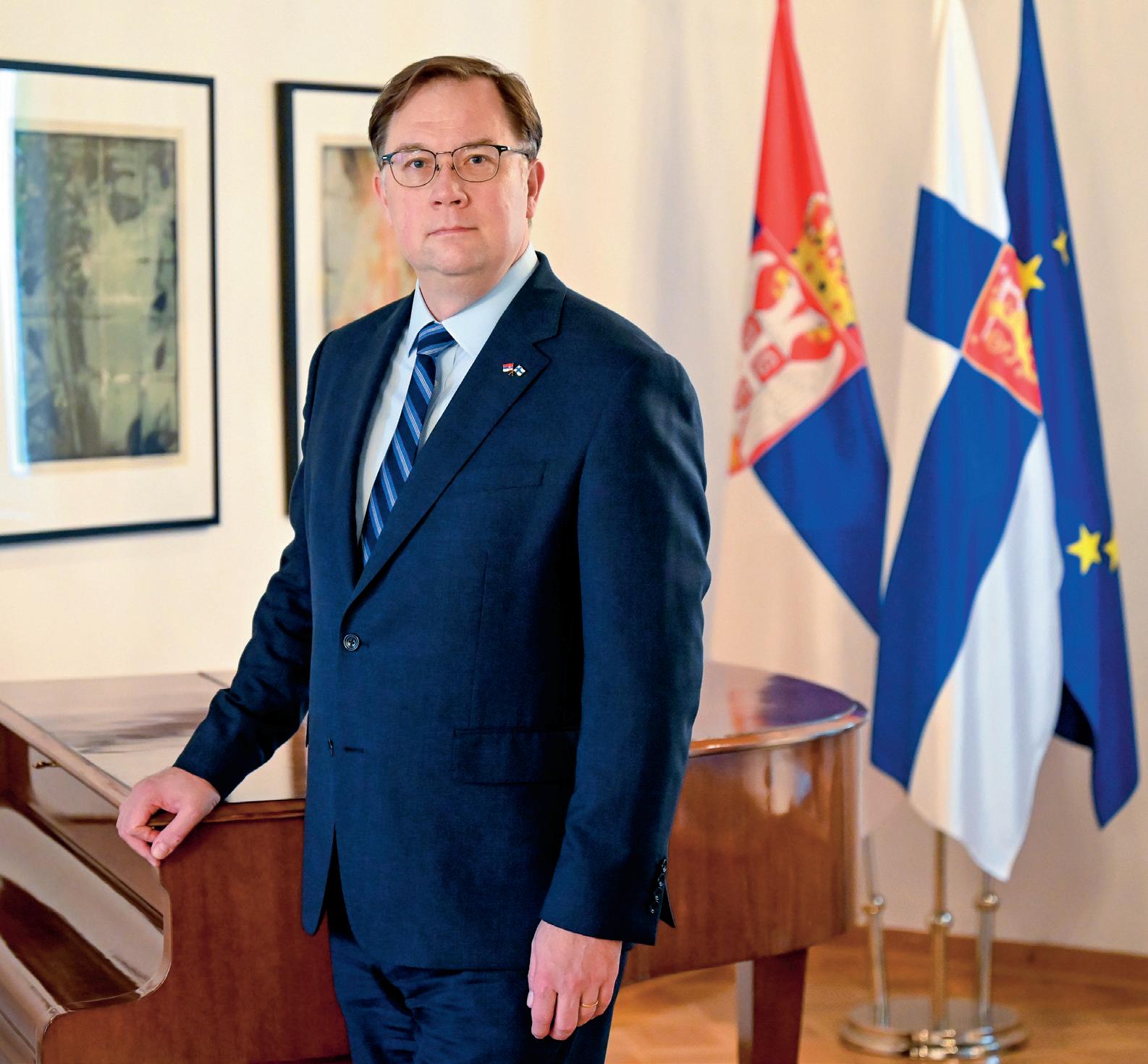
a Finnish author and artist. Another important anniversary we are marking this year is the 160th birthday of the Finnish composer Jean Sibelius.
Foreign Minister Valtonen’s recent visit to Belgrade as OSCE Chairper-
son-in-Office placed a spotlight on youth engagement, media freedom and regional cooperation. From your perspective, what was the importance of this visit for Finland’s partnership with Serbia, and what steps or opportunities
PROMOTION
Raising awareness among Finnish companies about Southeast Europe and Serbia and matching it with Finnish business offerings is central to our work
VALUES
Minister Valtonen reaffirmed our support for Serbia’s EU path and the importance of Serbia’s full commitment to democracy, media freedom, and peaceful assembly
DIALOGUE
As NATO Contact Point Embassy with Germany, we aim to foster dialogue and raise awareness of NATO in Serbia amid today’s evolving European landscape
do you expect it to open in the period ahead?
— Indeed, Foreign Minister Valtonen recently visited Belgrade in her capacity as the OSCE Chairperson-in-Office (CiO). Minister Valtonen met with Serbian officials as well as with representatives of civil society. In the discussions, she emphasised the importance of youth engagement, media freedom and regional cooperation. Moreover, she conveyed her firm view that freedom of peaceful assembly is a central pillar of democracy.
Bilaterally, Finland continues to support Serbia on its path towards EU membership. This requires that the Serbian government tackles cor-
Our goal is to deepen cooperation through innovation, sustainability, and dialogue — setting new standards in Finnish–Serbian relations
ruption and implements reforms that strengthen the rule of law and citizens’ freedoms. The OSCE’s support for Serbia in implementing these reforms is very important, as it facilitates the country’s progress towards EU accession.
You’ve highlighted that demand for sustainable products and solutions will grow strongly in the coming years. Which areas of Serbia’s economy do you see as most ready to benefit from Finnish expertise in the circular economy, clean technologies and renewable energy? — Serbia has significant capacity and potential across many sectors, ranging from renewable energy and bioecon-
omy to expertise in the IT sector. I see major opportunities for the manufacturing sector to benefit from Finnish expertise and smart solutions. This includes industrial symbiosis, eco-design and clean-production technologies.
Finland is one of the pioneers of the circular economy. Finnish companies and institutions view the global transition towards a circular and carbon-neutral economy as an opportunity to address global challenges. We aim to apply this vision also in the Serbian market and to promote it among local stakeholders. Furthermore, Finland has for decades focused on developing renewable energy sources. In the past couple of years, several Finnish companies have entered the Serbian market, either as investors or as service and technology providers in renewable energy and green economy projects. This is a direct contribution to Serbia’s economy and its sustainability.
Finland’s new Team Finland strategy for 2025–2027 puts strong emphasis on supporting exports and international business growth. How is the Embassy in Belgrade working to translate this into concrete opportunities for Finnish and Serbian companies?
— This is the core of our trade-promotion efforts. We work tirelessly to identify growing demand in the Serbian economy and to match it with Finnish business expertise and knowhow. This means collaborating with relevant stakeholders, including national and local authorities, companies, research institutes and the international community.
The Embassy provides tailored support for Finnish small, medium-sized and large enterprises operating in the
Serbian market. Moreover, we promote business opportunities in Serbia to Finnish companies that have expressed interest in entering the market. Raising awareness among Finnish companies about Southeast Europe – one of Europe’s fastest-growing regions – is increasingly important. We do this annually during our Team Finland Days in Helsinki. We also work closely with our Nordic colleagues whenever there is a joint interest in collaborating under the Nordic umbrella.
Since 2025, Finland has been serving as one of NATO’s Contact Point embassies in Serbia. How do you see this role creating opportunities for dialogue and practical cooperation on modern security challenges while supporting regional stability?
— Together with the Embassy of Germany, we have been appointed NATO Contact Point Embassies in Serbia for a two-year period. I believe the role of the Contact Point Embassies is increasingly important given the current geopolitical landscape in Europe. Our focus during these two years is to foster dialogue and raise awareness of NATO in Serbia – both in general terms and through our own experience of joining the Alliance.
We have been active in organising events and engaging citizens via social media. In April, we held a successful seminar targeted at youth, focusing on Finland’s accession to NATO. I have also had excellent discussions at the Military Academy about the partnership between the Serbian Armed Forces and NATO. Moreover, we have facilitated visits by members of NATO HQ to Belgrade, thus strengthening exchanges between NATO and Serbian officials.
Global Experience and Local Expertise
Marijana Vasilescu CEO of MediGroup
Through strategic integration with Finland’s Mehiläinen Group, MediGroup will enter a new phase of growth that will redefine private healthcare standards in Serbia and the region.
CEO Marijana Vasilescu shares how the company plans to combine Nordic excellence, digital innovation, and local expertise to create a sustainable and patient-centred healthcare model
With more than twelve years of continuous growth, MediGroup has established itself as the largest private healthcare system in Serbia and one of the most advanced in the region. Earlier this year, the company announced its upcoming integration into Mehiläinen Group – one of Finland’s leading healthcare providers with over 115 years of experience. Upon receiving all regulatory approvals, this strategic step will mark a new chapter for private healthcare in Serbia, opening opportunities for international collaboration, innovation, and the introduction of advanced healthcare models. In this interview, Marijana Vasilescu, CEO of MediGroup, shares her vision for the future of healthcare in Serbia and the region.
The upcoming integration of MediGroup into Mehiläinen Group is seen as a new chapter for private healthcare in Serbia and the region. How do you expect this step to shape the future of healthcare delivery in this part of Europe?
— Joining Mehiläinen Group represents a defining milestone in MediGroup’s development and a strong recognition of Serbia’s growing relevance within the European healthcare landscape. Mehiläinen brings a century-long legacy of clinical excellence, governance, and sustainable growth. Together with Romania’s Regina Maria net-

work, we are becoming part of one of the most significant healthcare alliances in Central and Eastern Europe.
For MediGroup, this partnership is not a transaction – it is a strategic alignment of values. We share the same focus on patient experience, medical excellence, and continuous investment in technology and people. These principles will guide our cooperation, enabling the transfer of expertise and the implementation of advanced European practices.
Ultimately, this integration will further enhance the quality of patient experience through access to cutting-edge equipment, advanced digital tools, and continuous professional development of our teams, while
contributing to the broader modernisation of the regional healthcare ecosystem.
How do you see MediGroup balancing global expertise and local needs when introducing new healthcare models in Serbia?
— The strength of this partnership lies in combining international knowledge with the continuous education of our medical teams, ensuring that global expertise becomes everyday practice in our clinics. Serbia has a specific healthcare landscape, shaped by both public and private systems and by patients’ growing expectations. Our role is to translate proven global models into locally relevant solutions – not to replicate, but to adapt them intelligently.
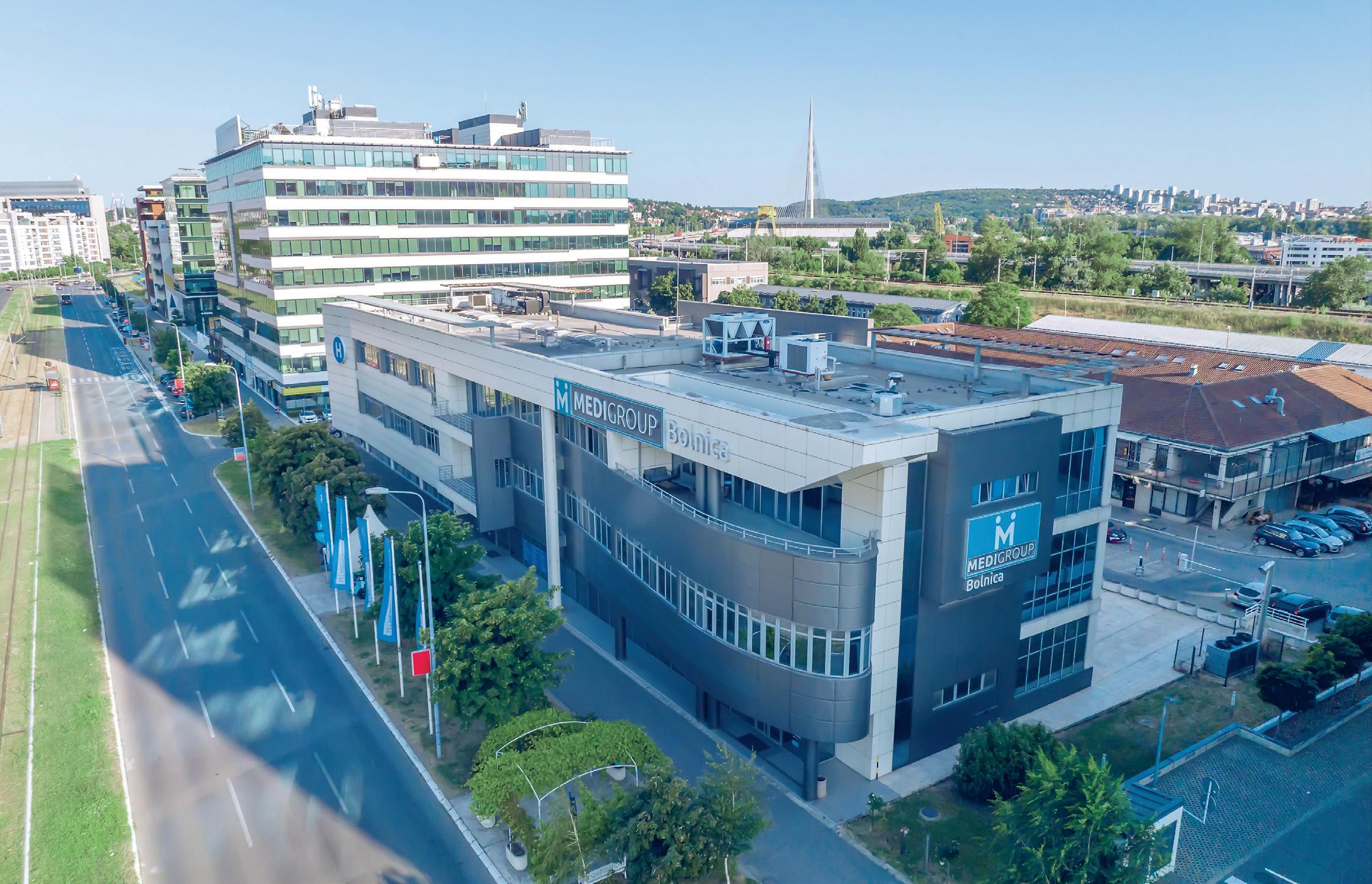
We focus on innovations that work in real clinical practice: models that enhance accessibility and efficiency while preserving the trust and personal connection we have built with patients for more than a decade. That trust remains the compass guiding every step of our transformation. Our objective is clear – to bridge global excellence with local expertise, ensuring that every innovation we introduce strengthens healthcare delivery and supports the sustainable growth of the system.
Nordic healthcare systems are known for their efficiency and patient-centred approach. Which principles of this model do you find most relevant and applicable in Serbia, and how can MediGroup successfully adapt them locally?
— I agree – Nordic healthcare systems are globally admired for their efficiency, trans-
parency, and respect for the individual patient. Their focus on accessibility, prevention, and continuity of care fully aligns with MediGroup’s strategic direction.
At the core of the Nordic model is a strong primary care network, clear patient pathways, and seamless coordination between all levels of healthcare – principles that are highly relevant for us. With the support of Mehiläinen’s experience, we plan to apply these frameworks to improve both quality and efficiency in patient care.
We also share the Nordic belief that prevention and early detection are essential for healthcare. Serbia’s awareness in this area is growing, and MediGroup is ready to transform that awareness into tangible practice. By pairing preventive care with investment in modern technology and medical training, we can bring Nordic standards of quality into the local healthcare
MEDIGROUP ONCE AGAIN NAMED TOP WORKPLACE AND BEST OF THE BEST 2025
At this year’s HR Weekend in Rovinj, MediGroup was recognised with the Top Workplace 2025 award for the second consecutive year, along with the Best of the Best award. Based on extensive employee satisfaction research, these awards highlight MediGroup’s strong culture, engagement, and commitment to excellence in healthcare.
environment. The result will undoubtedly be a healthcare model that is efficient, patient-centred, and future-oriented.
As healthcare systems evolve, technology and data are playing a growing role. How do you see MediGroup using innovation to shape the healthcare of the future?
— Technology and data are redefining what quality, accessibility, and continuity of care mean. For MediGroup, the implementation of technology and digital solutions is the foundation of how we will deliver smarter, more connected, and more sustainable healthcare.
Advanced digital platforms will strengthen patient pathways, improve clinical decision-making, and personalise healthcare like never before. These tools will help doctors make faster, more accurate decisions, reduce administrative burden, and give patients greater control and clarity in managing their health.
Yet our vision of digitalisation remains firmly human-centred. Technology must empower professionals, not replace them. By combining data, expertise, and empathy, we intend to lead Serbia’s private healthcare sector into a new digital era – one defined by trust and transparency.
Many Opportunities for Cooperation
The most important areas of cooperation between Norway and Serbia include the green transition, energy diversification and knowledge transfer, alongside security, good governance and economic development
H.E. Ms Kristin MELSOM Ambassador of Norway to Serbia
Norway and Serbia maintain an active and evolving bilateral relationship, characterised by diplomatic engagement, development and economic cooperation, and shared interests in regional stability and European integration. Indeed, says H.E. Ms Kristin Melsom, Ambassador of Norway to Serbia, “economic relations between Norway and Serbia have seen steady growth.” Norway’s development cooperation with Serbia further strengthens bilateral ties. Through its assistance programmes, Norway supports initiatives aimed at enhancing security, good governance and economic development. Norway’s strategic goal is to contribute to regional stability and Serbia’s integration into Euro-Atlantic structures.
In your view, which areas offer the greatest potential for further improvement and deeper cooperation?
— When it comes to the greatest potential for cooperation, I believe it lies in the green transition, energy diversification and knowledge transfer. Innovation is another area where we could expand our relations through the exchange of technology and ideas. In recent years, our cooperation has focused on providing expert support to Serbia in areas such as energy, youth mental health and media freedom.
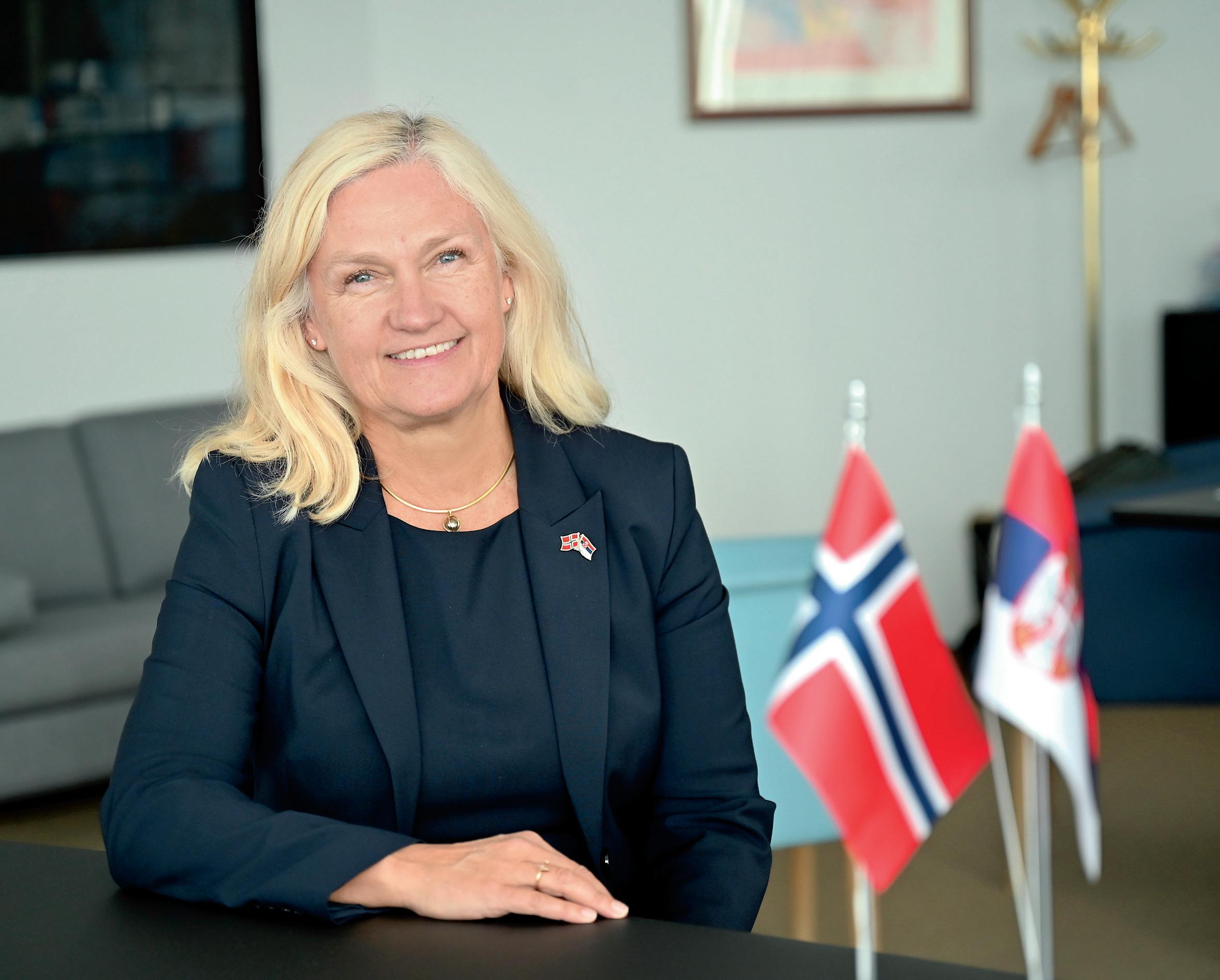
What were the key objectives of the visit of Mr Eirik Nesteas Mathisen, Norway’s Special Envoy for the Western Balkans, and in what ways might his engagement support Serbia’s European integration, the Belgrade–Pristina dialogue and stability in the wider region?
— The visit of Mr Eirik Nesteas Mathisen in May this year aimed to reinforce
Norway’s commitment to supporting Serbia’s European integration, facilitate the Belgrade–Pristina dialogue, promote regional stability and discuss the geopolitical situation in Europe. During meetings with Serbian officials, we emphasised Norway’s active engagement in the Western Balkans and its readiness to deepen bilateral cooperation. We hope that
INTEGRATION
Norway’s strategic goal is to contribute to regional stability and Serbia’s integration into Euro-Atlantic structures
PROGRESS
Serbia has taken steps to improve judicial efficiency and accountability; however, the pace and depth of reform remain under scrutiny, and further institutional strengthening is needed
TRANSITION
Serbia knows what must be done: to shift from fossil fuels and rethink industry, requiring alignment between business, government and academia for real progress
Mathisen’s involvement will foster a more nuanced understanding of the realities on the ground and contribute to constructive dialogue.
Norway has been a longstanding partner in supporting Serbia’s reforms in the judiciary and the rule of law. From your perspective, how much progress has Serbia achieved in this area so far, and which aspects of judicial digitalisation would most benefit from further cooperation as the country advances on its European integration path? — Ten years ago, Norway supported the reconstruction and renovation of
True progress depends on linking innovation, governance and sustainability –turning cooperation into long-term resilience
multiple court buildings across Serbia. Digitalisation is another area where Norway’s support could prove transformative. Serbia has begun implementing an IT solution for prosecutorial case management but still lacks a uniform and centralised system for courts. Norway has strong capacity in this field, and the Norwegian Courts Administration is currently working in the region, primarily in Bosnia and Herzegovina, Montenegro and Kosovo, while Serbia participates in the working group.
I would say that Serbia has made notable progress in reforming its judiciary and strengthening the rule of law, particularly through the constitutional amendments adopted in 2022. However, challenges remain. The European Commission’s 2025 Rule of Law
Report highlighted persistent issues such as political pressure on courts and prosecutors, a lack of transparency in judicial appointments, and limited progress in prosecuting high-level corruption cases. So, while Serbia has taken steps to improve judicial efficiency and accountability, the pace and depth of reform remain under scrutiny, and further institutional strengthening is still needed.
How do you see the role and impact of the newly established Centre of Excellence in supporting Serbia’s EU accession process?
— The newly established Centre of Excellence plays a pivotal role in strengthening Serbia’s institutional capacity for EU accession. Created within the Ministry of European Integration and supported by Norway through UNOPS, the Centre is designed to serve as a hub for coordination, expert exchange and technical support. Its primary mission is to enhance the efficiency of reform processes by recruiting experts and providing tailored assistance to institutions involved in accession negotiations.
The Centre also facilitates the transfer of knowledge and best practices from EU member states, helping Serbia align more effectively with the EU acquis. This initiative is part of the broader Knowledge for Reform Action in the Western Balkans programme, which consolidates expertise from ministries and institutions that have been engaged in the integration process for years.
Norway and the Nordic countries have long supported Serbia’s green transition. You have noted that this process is not only about reducing emissions but also about changing
how we produce, use and reuse resources. How do you assess the results achieved so far, and where do you see the greatest opportunities for future cooperation?
— We have been actively engaged in circular economy and energy transformation initiatives in Serbia in recent years. One notable example is the Balkan Renewable Energy Accelerator project, which will produce investment plans for decarbonising the Western Balkans’ heat and power sectors by identifying investment-ready projects and engaging local public utilities, private investors and technology providers.
I would say that both the authorities and businesses in Serbia are fully aware of what needs to be done. However, it is a complex process that requires a shift towards energy production less dependent on fossil fuels, as well as a change in the way we think and plan practically any industrial endeavour. These two must go hand in hand, requiring coordination between the business sector, national institutions at all levels and academia. On this topic, let me also mention that two Norwegian companies operate in Serbia – TOMRA, which specialises in recycling, and CAMBI, which works in wastewater treatment.
Overall, it is difficult to measure results at this stage, nor should I be the one to do so. I can only say that, considering the complexity and the ambitious goals set out in Serbia’s national energy strategy, there is still a long way to go, though concrete steps have been taken. We certainly intend to continue sharing our experiences and ideas from Norway with our partners here. There are many talented people we have met who are doing excellent work, so indeed, Serbia has great potential.
NORDIC BUSINESS CULTURE
Trust, Equality and Innovation as the Foundation of Competitiveness
Nordic economies are consistently ranked among the world’s most innovative, competitive and socially advanced. Behind this success lies a distinct business culture shaped by trust, transparency, equality and long-term thinking. For companies from Denmark, Finland, Sweden and Norway operating in Serbia, these values are not slogans, but practical frameworks that have helped build resilient organisations, efficient teams and sustainable growth models
At the heart of the Nordic business mindset is trust. Workplaces are built on responsibility, autonomy and open communication. Decision-making is decentralised, managers are accessible, and employees are encouraged to take initiative. This culture reduces formal barriers, accelerates cooperation and increases productivity. In Nordic companies present on the Serbian market, this is visible through team-oriented work, project responsibility and a strong emphasis on professional development.
Equality is another core value. Nordic organisations are known for flat hierarchies, inclusive leadership and transparent career advancement. Titles carry less importance than competencies, and collaboration is more valued than competition. This creates a work environment in which everyone can contribute, regardless of age, gender or background — fostering cre -
ativity and loyalty. These principles have proven attractive to Serbian professionals, especially younger generations seeking a modern and motivating workplace.
A central pillar of this culture is innovation — not only in technology, but in ways of thinking. Nordic companies invest heavily in research, sustainability and digital transformation. Whether in renewable energy, telecommunications, urban infrastructure or healthcare, they strive to develop longterm solutions rather than short-term gains. The same approach is applied to the Serbian market, where Nordic investors often combine commer-
Nordic companies prove that sustainable success comes from trust, innovation and respect for people — values that create strong organisations and strong communities
cial growth with knowledge transfer, training and support for local talent.
Work–life balance is also a defining feature. Nordic businesses view employee wellbeing as a foundation of productivity, not a cost. Flexibility, respect for personal time and healthy work environments result in lower stress, higher motivation and better results. This philosophy has begun influencing business practices in Serbia,

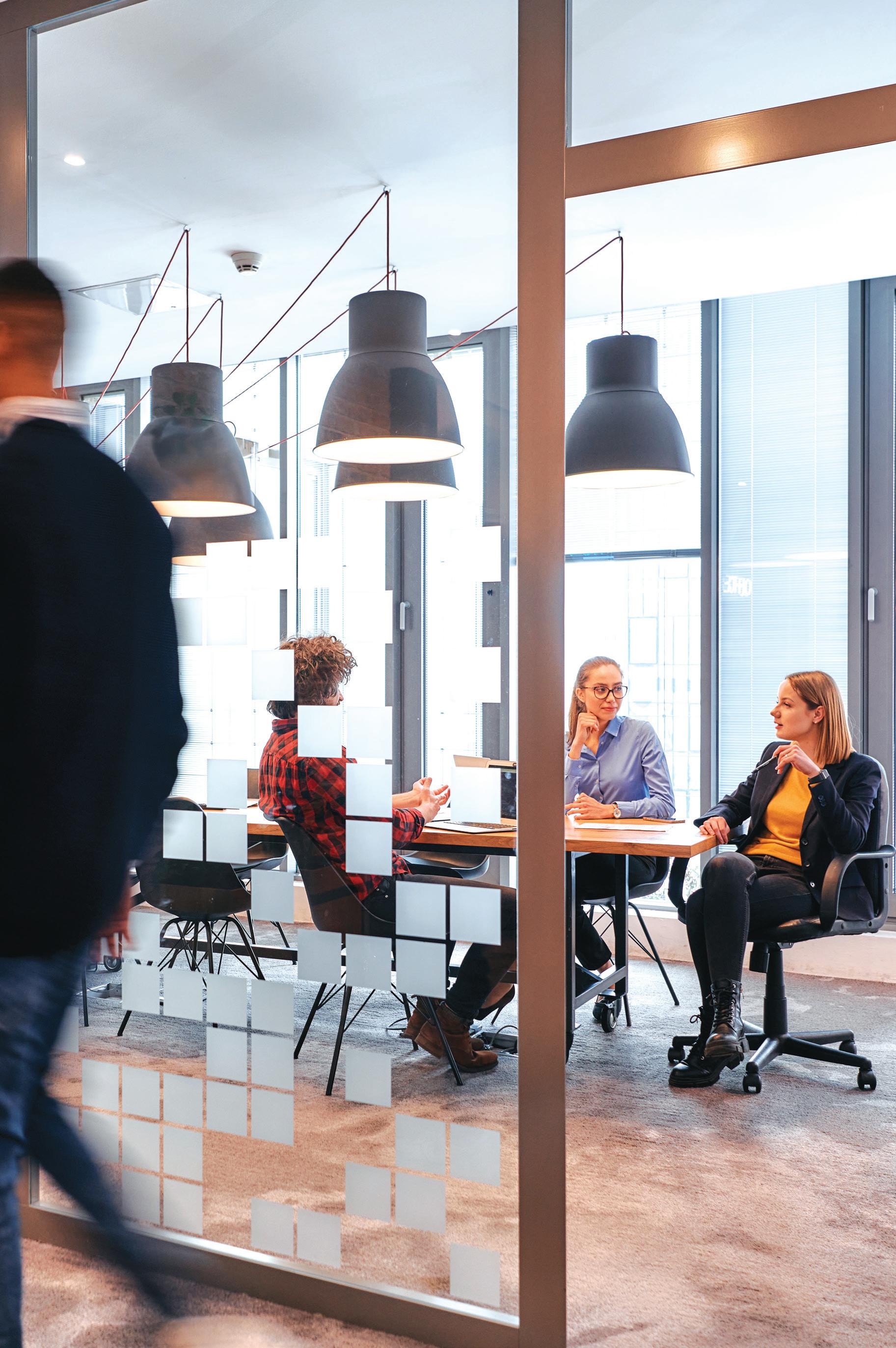
A central pillar of this culture is innovation — not only in technology, but in ways of thinking
where more companies recognise that success depends on people — their wellbeing, energy and creativity.
Another important characteristic is the strong link between business and sustainability. For Nordic companies, environmental responsibility is part of corporate identity. Investments in renewable energy, energy efficiency, circular economy and clean technologies are not only economic decisions, but reflections of national culture. This mindset aligns with Serbia’s broader green transition and its ambition to attract responsible investors.
The Nordic model is not just a business formula — it is a partnership with society. Companies are expected to contribute to communities, respect the environment and operate transparently. The result is a stable ecosystem in which trust between the state, citizens, companies and institutions generates long-term value.
In Serbia, Nordic companies have become examples of professionalism, corporate ethics and respect for employees. Their presence enriches the business environment not only economically, but culturally. By bringing innovation, sustainability, high standards and modern management practices, they set a benchmark that inspires others.
Nordic business culture shows that competitiveness is not built on pressure or hierarchy, but on knowledge, responsibility, cooperation and respect.
Helping Energy Stability and the Green Transition
Sweden continues to support Serbia´s EU integration process in the environmental sector and green transition focusing on sustainable development, digital transformation and regional stability. This is a foundation for a resilient, forwardlooking partnership
H.E. Mrs. Charlotte Sabina SAMMELIN Ambassador of Sweden to Serbia
Sweden and Serbia enjoy longstanding bilateral relations and, through a long cooperation, we have continuously developed new avenues of engagement.
“Sweden values it constructive relationship with Serbia, built on mutual respect and shared interests,” says H.E. Charlotte Sabina Sammelin, Ambassador of Sweden to Serbia. “Our cooperation is support-ed by deep people-to-people connections, with approximately 180,000 people of Serbian origin living in Swe-den. Serbia’s strategic role in the West-ern Balkans remains central to Swe-den’s regional engagement.”
Sweden continues to support Serbia’s EU integration process, which provides the framework for reforms and alignment with European values. Sweden is one of the largest bilateral donors in Serbia, playing a leading role in the environmental sector and the green transition. “Our engagement is guided by principles of transparency, democracy and human rights,” notes the Ambassador.
With around 200 Swedish busi-nesses active in Serbia, including Tet-ra Pak, IKEA and Ericsson, Swedish industry contributes to innovation and sustainable growth, fully aligned with Sweden’s foreign trade strategy.
With Europe facing both climate commitments and energy securi-

ty concerns, how do you see Serbia and Sweden working together to balance energy stability with the green transition?
— Climate action is more urgent than ever, and Sweden continues to play a leading role in Europe’s green transition. Our bilateral cooperation with Serbia in this field is essential. The opportunities within the green transition are immense: climate action creates jobs, strengthens competitiveness and attracts sustainable investment. Sweden remains a strong international voice in climate negotiations and is committed to supporting partners in aligning with the European Green Deal.
Over the years, Sweden has worked closely with Serbia in the environmental field. Since 1998, Sweden has provided more than EUR 325 million in total bilateral aid to Serbia. Sweden also contributes directly to the green transition through support for innovative projects. One example is “EU for the Green Agenda in Serbia”, implemented in partnership with UNDP and the European Investment Bank. The project aims to strengthen governance and improve the management of wetland ecosystems by building capacity for planning, implementation and enforcement of nature, water and climate policies, with concrete goals set for 2026. This initiative helps translate the European Green Deal into practice and supports Serbia in aligning its policy
LEADERSHIP
With climate action more urgent than ever, Sweden’s leadership in Europe’s green transition makes it a natural partner for Serbia
COOPERATION
Fostering competitiveness and responsible AI development requires open dialogue and collaboration. Sweden and Serbia stand to gain greatly from such engagement
CONFERENCE
The upcoming Smart City Conference in Belgrade will be a key platform for Sweden and Serbia to deepen collaboration, showcase innovative solutions and foster partnerships
and regulatory frameworks with the EU environmental acquis. It also lays the groundwork for a more resilient and sustainable economy.
Which sectors or types of partnerships do you see as the most promising for expanding Swedish–Serbian economic cooperation, and how can reforms in transparency and innovation support this process?
— Key opportunities for economic cooperation lie in sectors aligned with the green transition, such as renewable energy, energy efficiency, sustainable mining and electrified transport systems. Swedish companies, renowned
Sweden and the Nordic countries support rule-of-law reforms that promote transparency, accountability and human rights — essential for building public trust and aligning with European standards
for climate tech and circular-economy models, offer scalable solutions well suited to Serbia’s reform ambitions. Reforms in transparency, innovation and environmental governance not only enhance investor confidence, but also streamline regulatory processes, making Serbia a more predictable and attractive destination for foreign investment.
A flagship example is Sweden’s forthcoming support for Serbia’s green transition through a large-scale solar-energy initiative valued at approximately EUR 1.6 billion. This project includes 1 GW of solar capacity and 200 MW of battery storage. Swedish actors such as Hitachi Energy, the Swedish Export Credit Agency and the Swedish Ex-
port Credit Corporation are contributing to this strategic effort, which accelerates Serbia’s shift away from fossil fuels and supports its progress towards EU accession.
Smart and sustainable cities represent another promising area for cooperation. Sweden’s expertise in sustainable urban planning and the circular economy — exemplified by projects like the Stockholm Royal Seaport — can complement Serbia’s ambitions in environmental technology and digital infrastructure. The upcoming Smart City Conference in Belgrade in February will offer a timely platform to deepen this dialogue, showcase innovative solutions and foster new partnerships between Swedish and Serbian stakeholders.
What opportunities do you see for Swedish–Serbian cooperation in developing legal and regulatory frameworks that both encourage innovation and ensure competitiveness and trustworthiness?
— Sweden’s digital strategy is built on values such as ethical AI, secure data infrastructure and transparency — principles that resonate with broader European regulatory ambitions. As Serbia continues to develop its digital governance and align with EU standards, there is room for mutual learning and exchange of experience.
Sweden’s approach to building trustworthy digital ecosystems, particularly in the public sector where secure services and transparent algorithms are key, offers useful insights. Informal cooperation — such as academic dialogue, joint workshops or knowledge-sharing between institutions — could help both countries explore regulatory models that balance innovation with public trust.
Ultimately, fostering competitiveness and responsible AI development requires open channels for dialogue and collaboration. Sweden and Serbia, each with their own strengths, have much to gain from such engagement.
Sweden has long supported Serbia in strengthening the rule of law and police capacities. How can Swedish and Nordic experience be most valuable in helping Serbia build stronger trust and alignment with European standards? — Sweden remains firmly committed to strengthening the rule of law as a cornerstone of democratic societies and global security.
In today’s interconnected world, the rule of law is under increasing pressure from transnational threats — not least organised crime, which exploits digital tools, financial systems and jurisdictional gaps to operate across borders with growing sophistication. As criminal networks evolve, the need for smarter, more collaborative policing has never been greater.
To address these challenges, we must invest in intelligence-led policing, robust financial investigations and digital innovation. Intelligence-led policing helps prevent and disrupt crime before it escalates. Tackling criminal finances — through asset recovery, financial investigations and non-conviction-based confiscation — is key to dismantling illicit networks. Digital transformation is equally vital, with integrated intelligence systems improving coordination and enabling timely, data-driven responses aligned with European and international standards.
Sweden sees key opportunities for progress in expanding these approac hes.
Science and Partnership for Better Health
Aleksandar Tripković Governmental Affairs & Market Access Manager, Astra Zeneca
Through science-led innovation and long-term partnerships, AstraZeneca strengthens Serbia’s healthcare system and supports earlier access to advanced therapies
In an interview for CorD Magazine, Aleksandar Tripković, Governmental Affairs & Market Access Manager of AstraZeneca Serbia, discusses the company’s mission to improve patient outcomes through innovation and collaboration. He highlights AstraZeneca’s four-decade presence in Serbia, its investment in clinical research, early cancer detection, and initiatives that enhance the overall capacity and resilience of the national healthcare system.
AstraZeneca has for decades been recognised as one of the global leaders in innovative therapies and scientific research. How would you assess the company’s development in Serbia and the contribution AstraZeneca makes to improving the healthcare system and access to modern therapies?
— AstraZeneca is a science-led biopharmaceutical company whose innovative medicines reach patients in more than 125 countries. In Serbia, AstraZeneca has been active for over four decades, and our role as an innovative company has grown steadily as we focus on areas where we can make the greatest difference – oncology, rare diseas-
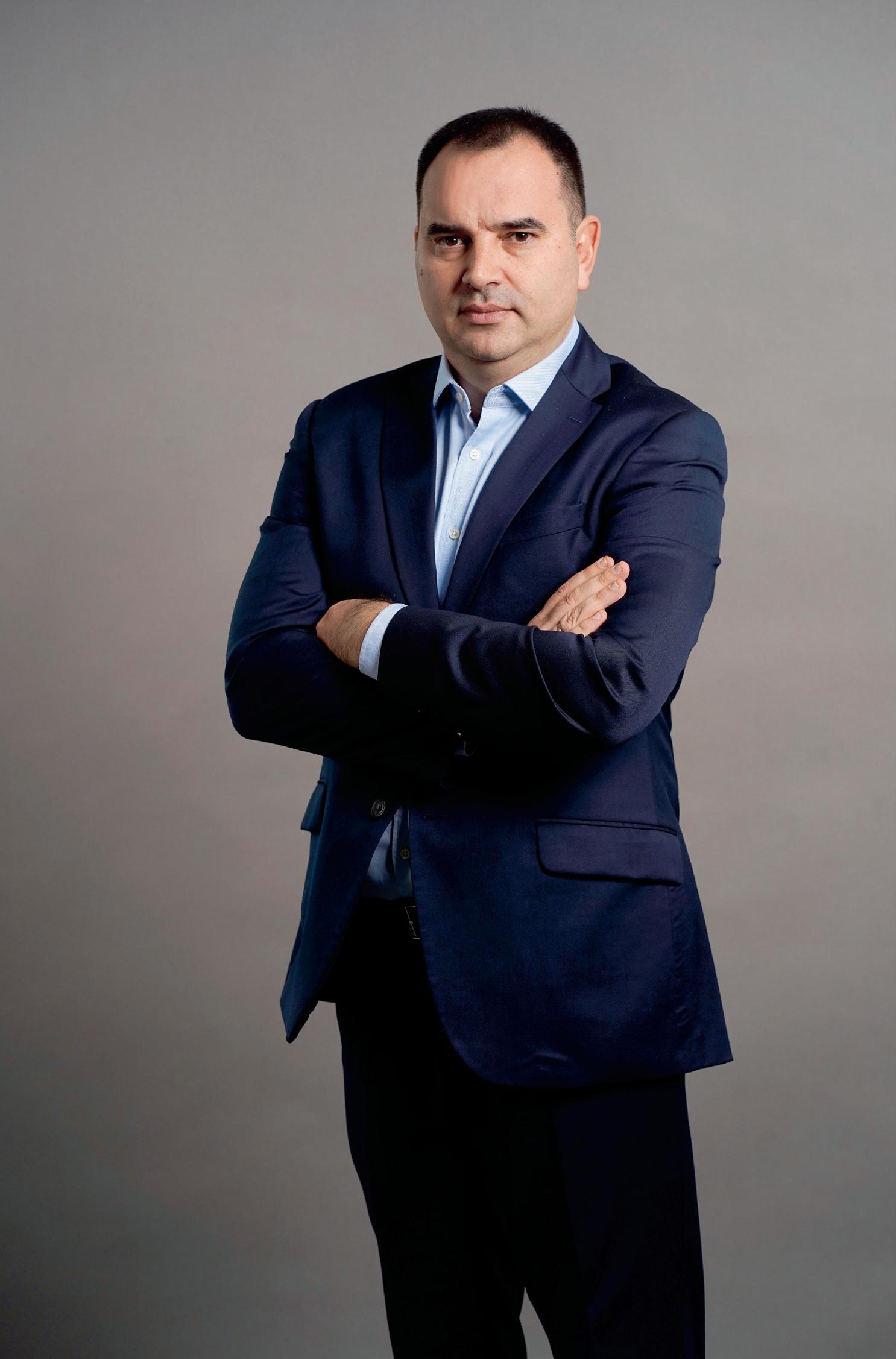
es, and cardiovascular, renal & metabolism, respiratory, and immunology.
Our bold ambition is clear: to transform outcomes and bring life-changing therapies to Serbian patients as early as possible. That ambition is reflected in how we work and invest locally. We have more than doubled in size to over 100 professionals. Also, we have initiated clinical trials in Serbia, giving patients and clinicians earlier access to cutting-edge therapies while strengthening the local research ecosystem through investigator training, data quality standards, and international collaboration. These efforts help accelerate access and build capacity across the healthcare system.
We pursue this through partnership, because sustained progress happens when the healthcare system advances as one. One example is our collaboration with the Ministry of Health, the Embassy of Sweden and Business Sweden to strengthen screening, optimise patient pathways from referral to treatment, and support clinician education in breast cancer. We also invest in public awareness and community engagement. In 2024, we supported a breast cancer theatre production that brought the topic clos-
breast cancer pathways – to enable precision medicine and align with international standards. We are also exploring AI-enabled early detection approaches, including for lung cancer, to shorten the time to diagnosis and improve outcomes. We work with clinicians and partners to embed integrated care pathways, strengthen multidisciplinary decision-making, and ensure consistent, guideline-based practices. It is important for Serbia to keep pace with neighbouring countries in adopting innovative therapies so that patients are not left behind. Training and digital resources for clinicians are prioritised to sustain high-quality implementation.
Recently, as part of a project implemented by the Ministry of Health of the Republic of Serbia and the Embassy of Sweden, with support from AstraZeneca, you visited Malmö. Can you tell us more about the visit and its significance?
— The visit to Malmö formed part of the Serbia–Sweden collaboration led by the Ministry of Health and the Embassy of Sweden, with support from AstraZeneca. The programme focused on exchanging best prac-
Sustained progress in healthcare happens when the entire system moves together through innovation, collaboration, and shared responsibility
er to the wider community in a human and relatable way – encouraging women to attend regular check-ups and helping early diagnosis become the norm rather than the exception.
How much are investment in science, research, and collaboration with healthcare institutions in Serbia part of your strategy for long-term growth and business sustainability?
— They are at the core of our long-term strategy. Globally, AstraZeneca is committed to science-driven innovation and multi-stakeholder partnerships; locally, this includes memoranda of understanding and programmes linking biomedicine and biotechnology to tangible improvements in care. We support genomic testing relevant to oncology – such as BRCA testing within early
tices in prevention, screening, and integrated oncology care.
Through meetings with Swedish clinical teams, the Serbian delegation examined how mammography screening is organised, the optimisation of patient pathways from referral through diagnosis and treatment, the structure and functioning of multidisciplinary tumour boards, the role of registries, and patient navigation in ensuring continuity of care.
The significance lies in translating proven Swedish approaches – including standardised protocols, quality indicators, and outcomes tracking – into actionable steps for Serbia. The visit informed recommendations on screening coverage, diagnostic timeliness, and expanding access to innovative therapies, fully in line with AstraZeneca’s bold ambition in oncology.
What are the most important lessons and experiences from the Swedish healthcare system that could be applicable in Serbia, especially in the area of prevention and early detection of breast cancer?
— Several lessons stand out for Serbia. First, standardised, quality-assured population screening with clear eligibility criteria and high coverage targets improves stage at diagnosis and survival rates. Secondly, registry-based outcomes and operational analytics enable benchmarking and continuous improvement.
Equally important are integrated multidisciplinary care and the systematic use of biomarkers and genomic testing, including BRCA, which are of paramount importance. Finally, patient navigation and psychosocial support increase adherence and reduce loss to follow-up. Serbia can phase in these practices through training and systematic measurement.
It is also essential to keep pace with neighbouring countries in adopting innovative therapies, as unequal access across Europe leads to poorer survival outcomes.
What are AstraZeneca’s further plans in Serbia – can we expect new projects, innovations, or partnerships that will additionally contribute to the development of the healthcare system and better outcomes for patients?
— AstraZeneca will continue to expand multi-stakeholder initiatives across oncology –further enhancing screening, diagnostics, and timely access to therapy – to strengthen Serbia’s healthcare system and improve patient outcomes.
Clinical trials are already under way in Serbia, with plans to expand research and translational innovation. Our priority remains reaching agreements that enable rapid and equitable access to innovative medicines that transform patients’ lives, ensuring Serbia keeps pace with Europe.
Digital and AI-enabled tools for earlier detection, clinician training, and patient support will also continue to develop. Beyond the clinical sphere, community engagement remains vital. All our activities are aligned with national priorities and evidence-based standards, with the overarching goal of earlier diagnosis, better outcomes, and resilient patient pathways.
Partnerships That Build Sustainable Communities
Iva Petrović Executive Director of the Nordic Business Alliance
The Nordic Business Alliance is expanding its Smart Cities roadmap across the Western Balkans, connecting Nordic experience with local innovation, sustainable development and community-focused solutions. Through knowledge transfer, regional cooperation and future EU-funded projects, the Alliance aims to turn smart city ambitions into practical, scalable results
As the Smart Cities agenda continues to evolve across Europe, the Nordic Business Alliance (NBA) is positioning itself as a key regional partner for sustainable development, innovation and cross-sector cooperation. Speaking for CorD, Iva Petrović, Executive Director of the Nordic Business Alliance, explains how the Nordic approach is being translated into local practice through conferences, partnerships, community projects and future regional programmes. With growing interest among municipalities and businesses, NBA now seeks to connect the concept of smart cities with broader economic development, stronger governance and new public-private opportunities in the Western Balkans.
How is the Smart Cities Roadmap further developing within the NBA programme? What activities have you carried out in 2025, and what are your plans to connect this concept with broader social development and business opportunities? — We’ve had a very active year for the Smart Cities initiative. The successful launch in 2024 was recognised by the Nordic Council of Ministers, which decided to support our efforts through the project Nordic Green and Smart Cities – Building Partnerships in the Western Balkans. Initiated by four Nordic embassies – Denmark, Finland, Norway and Sweden – in partnership with the Nordic Business Alliance, this project aims to facilitate the exchange of knowledge and experience between

countries and to create a solid foundation for long-term cooperation with local partners and stakeholders.
Under this umbrella, we have so far organised three conferences – in Kragujevac and Niš in April, and earlier this month in Podgorica. The first was inspired by the Danish journey, with a focus on energy efficiency and smart district heating. The second, inspired by cooperation between Oslo Metropolitan University (Norway) and the Faculty of Economics in Niš, highlighted how data analytics can enable smart, sustainable and resilient cities. The third conference marked our first Smart Cities initiative in Montenegro. Inspired by the Finnish experience, it examined the concept of the sustainable city as a service, with a focus on transport and mobility. We look forward to our fourth event in early 2026, which will showcase Swedish examples.
Relevant topics, inspiring speakers and an engaged audience motivate us to deepen this impact in a broader context – with concrete community projects and opportunities for public-private partnerships. Building smart communities is a collaborative effort. It goes beyond technology, placing citizens and engagement at the centre. Our goal is to support communities in turning their smart city ambitions into scalable realities. Naturally, innovative business ideas will play an important role. We have already held initial talks with key stakeholders, identified immediate opportunities, and will continue this work in the coming months.
As a regional association, how does the NBA contribute to strengthening collaboration between Nordic and local partners in the Western Balkans, particularly through projects that transfer experience and models of sustainable development? — Through our close and dynamic cooperation with the four Nordic embassies – Denmark, Finland, Norway and Sweden – we continue to build our position as a regional Nordic hub, recognised as a credible partner not
only for our member companies, but also for governments, international development organisations and other stakeholders.
Regional connectivity is important on many levels, especially in terms of market access, knowledge and innovation, and social integration. Many Nordic companies – including our members – already see this region as a single market. At events such as the recent conference in Podgorica, we brought together smart city enthusiasts to share national experiences and compare them with Nordic models. The conversations were lively, with numerous sideline meetings that we hope will lead to concrete business collaborations.
We are also pleased to announce that our new partner in Montenegro is
Smart communities are built through cooperation, citizen engagement and practical solutions – not just technology
the Association of Montenegrin Managers (AMM). Our joint ambition is to engage in EU-funded projects that promote cross-regional cooperation and the transfer of Nordic experience.
The Nordic model shows that regional connectivity is not only about infrastructure – it is equally about governance, sustainability and trust. We continue to learn from that experience, hoping that relevant lessons can be meaningfully applied in our regional context.
Is the Nordic Business Alliance involved in Horizon Europe projects and other EU initiatives that promote innovation and the green transition, and how do such programmes contribute to new partnerships between Nordic and domestic companies?
— This is planned for 2026. The Nordic Business Alliance will join a consortium applying for Horizon Europe funding under the European Excel-
lence Initiative. We will work with universities (in the Nordics, Serbia and Montenegro), research centres, companies, NGOs and public bodies to boost innovation capacity, digital transformation and sustainable development.
The project itself will be an example of cross-cutting cooperation and partnership, and our aim is to make its outcomes as relevant as possible for new business opportunities, especially for SMEs in Serbia.
Given the growing importance of public procurement in promoting ESG principles, how do you see the potential for integrating Nordic standards of sustainability and transparency into Serbia’s public procurement system?
— Serbia’s public procurement system is at a turning point. The country now has an opportunity to shift from a compliance-driven model to one that prioritises quality, innovation and sustainability. Achieving that is not just a matter of changing the law — it means upgrading institutions, skills and mindset. Nordic countries underwent this shift over the past 20 years.
A structured partnership with Nordic institutions would allow Serbia to draw on that experience: practical tools, transparent procedures and procurement models that reward long-term value rather than simply the lowest price. Such cooperation would strengthen institutions, make local companies more competitive and accelerate alignment with EU and global standards for sustainable procurement.
The goal is not a one-off initiative, but a lasting platform between Serbian and Nordic stakeholders. The focus would be tangible: pilot projects, knowledge transfer and measurable results. The next step is opening a formal dialogue between relevant Serbian and Nordic actors and working together on a new generation of public procurement — one that delivers better services to citizens, strengthens governance and supports sustainable growth.
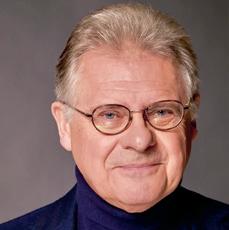
Strength lies not in size, but in the clarity of vision
Klas Eklund Swedish economist

Nordic Capital Raises Takeover Offer for Bavarian Nordic
A consortium led by Nordic Capital has increased its takeover bid for Danish biotech company Bavarian Nordic to DKK 250 (€33.5) per share, valuing the firm at over €3 billion. The deal would mark one of the largest biotech acquisitions in Scandinavia this decade.
Sweden Unveils SEK 7 Billion Tax-Cut Package for Small Business
The Swedish government has announced a SEK 7 billion (≈ €600 million) tax-relief package to support small businesses and boost competitiveness ahead of the 2026 election year. The initiative includes incentives for new investments and aims to accelerate job creation in key industrial regions.

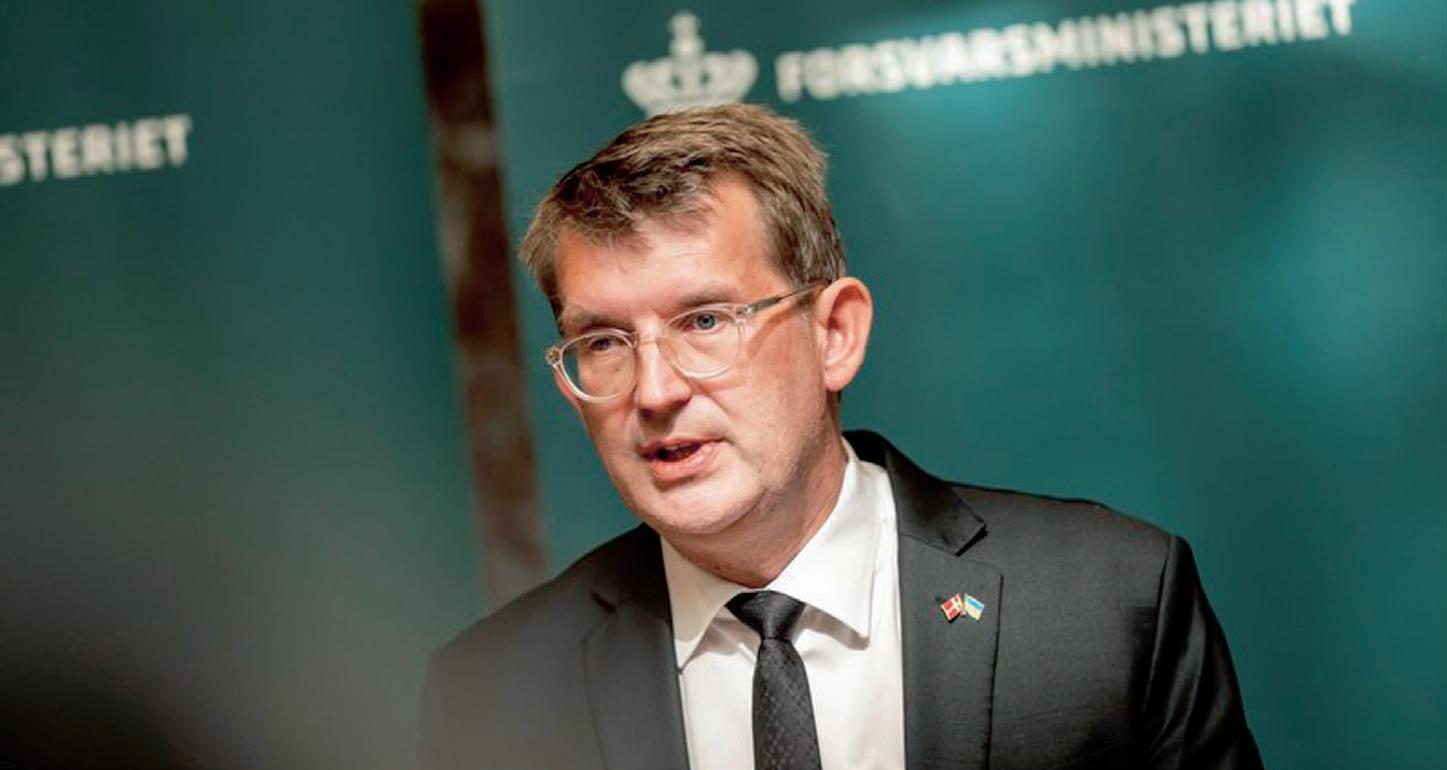
Denmark Places Record €9 Billion Defence Order
Citing heightened regional security needs, Denmark will acquire new European-made air-defence systems worth DKK 58 billion (€9.1 billion) — its largest defence procurement to date. The order underscores growing Nordic cooperation on defence and technology amid shifting geopolitical realities.

“Innovation is part of our survival instinct — not a strategy”
Ilkka Paananen CEO of Supercell (Finland)

Saab Eyes Landmark Gripen Deal with Ukraine
Sweden’s Saab AB revealed this week that it has signed a long-term cooperation agreement with Ukraine on air-defence systems. The deal could lead to the export of 100 to 150 Gripen E fighter jets, representing Sweden’s largest aircraft export order yet and marking a substantial boost for its defence-industrial sector.
EQT Puts Nordic Digital Infrastructure Giant Up for Sale
Swedish investment firm EQT has launched the sale of its broadband and data-centre group GlobalConnect, which operates across Sweden, Norway, Denmark, and Finland. The deal, estimated at around €8 billion, could be one of the largest infrastructure transactions ever seen in Northern Europe, reflecting surging investor appetite for digital assets.

